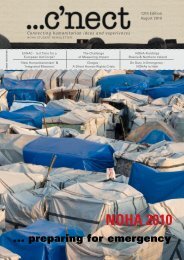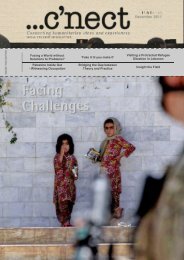Voices of the Voiceless - NOHA Alumni Community
Voices of the Voiceless - NOHA Alumni Community
Voices of the Voiceless - NOHA Alumni Community
Create successful ePaper yourself
Turn your PDF publications into a flip-book with our unique Google optimized e-Paper software.
12 ...C’neCt - 16 th Edition / July 2013<br />
Violence changes<br />
our lives, not our spirit<br />
Th<br />
e Democratic Republic<br />
<strong>of</strong> Congo is currently<br />
<strong>the</strong> poster child for <strong>the</strong><br />
helpless female victims <strong>of</strong> war.<br />
One does not have to look far to<br />
learn about <strong>the</strong> unimaginable<br />
things women, and men, are enduring<br />
on a daily basis in many<br />
areas <strong>of</strong> <strong>the</strong> DRC. What we are<br />
not hearing about is how women<br />
have fought to be a part <strong>of</strong> <strong>the</strong><br />
peace talks, to be a part <strong>of</strong> <strong>the</strong><br />
government, and to be a respected<br />
part <strong>of</strong> society with an<br />
equal voice. As usual, <strong>the</strong>se women<br />
are not doing it by force, by<br />
taking up arms and causing more<br />
grief.<br />
Co<br />
ngolese women have<br />
began to form selfhelp<br />
groups in <strong>the</strong> early 2000s in<br />
churches to provide support networks<br />
for each o<strong>the</strong>r and lay <strong>the</strong><br />
foundation <strong>of</strong> a more cohesive<br />
civil society. Congolese women<br />
went from having zero female<br />
representatives at <strong>the</strong> 1999 peace<br />
talks to filling 10 percent <strong>of</strong> <strong>the</strong><br />
seats in a 2002 Inter-Congolese<br />
Dialogue aimed at post-war reconciliation<br />
and national, social<br />
and political stability. Later in<br />
2003, Article 51 was added to <strong>the</strong><br />
transitional constitution to ensure<br />
women’s participation in <strong>the</strong> transition.<br />
During a referendum in<br />
2005, 51 percent <strong>of</strong> <strong>the</strong> electorate<br />
was female.<br />
Women have fought to<br />
be a part <strong>of</strong> <strong>the</strong> peace<br />
talks, to be a part <strong>of</strong><br />
<strong>the</strong> government, and to<br />
be a respected part <strong>of</strong><br />
society with an equal<br />
voice.<br />
Al<br />
though war has since<br />
<strong>the</strong>n returned to Eastern<br />
Congo, women continue to do<br />
<strong>the</strong>ir part. Different women associations<br />
exist - some have political<br />
or economical motivations,<br />
o<strong>the</strong>rs support ways for Congolese<br />
women to have meetings<br />
and face <strong>the</strong>ir day-to-day challenges.<br />
In <strong>the</strong> east <strong>of</strong> DRC <strong>the</strong>re<br />
are several committed groups that<br />
work in <strong>the</strong> grassroot level.<br />
AF<br />
EM-SK is a non-pr<strong>of</strong>it<br />
organization created<br />
under Congolose law in 2003,<br />
whose members are composed <strong>of</strong><br />
women active in South Kivu's media<br />
and news organization. AFEM-<br />
SK specializes in <strong>the</strong> production <strong>of</strong><br />
rural and urban radio shows with a<br />
major focus on women, drawing<br />
on radio clubs and local activists as<br />
a base; this organization also produces<br />
news reports from <strong>the</strong> field<br />
and sends news back to local radio<br />
stations. South Kivu Women's<br />
Media Association's overall objective<br />
is to promote peace through<br />
<strong>the</strong> media by <strong>the</strong> following specific<br />
objectives: work for women's and<br />
Congolese women's advancement<br />
through available media outlets;<br />
Congolese women have<br />
began to form self-help<br />
groups in <strong>the</strong> early<br />
2000s in churches to<br />
provide support networks<br />
for each o<strong>the</strong>r<br />
and lay <strong>the</strong> foundation<br />
<strong>of</strong> a more cohesive civil<br />
society.<br />
“You can have peace. Or you can have freedom. Don't ever count on having both at once.” ― Robert A. Heinlein




